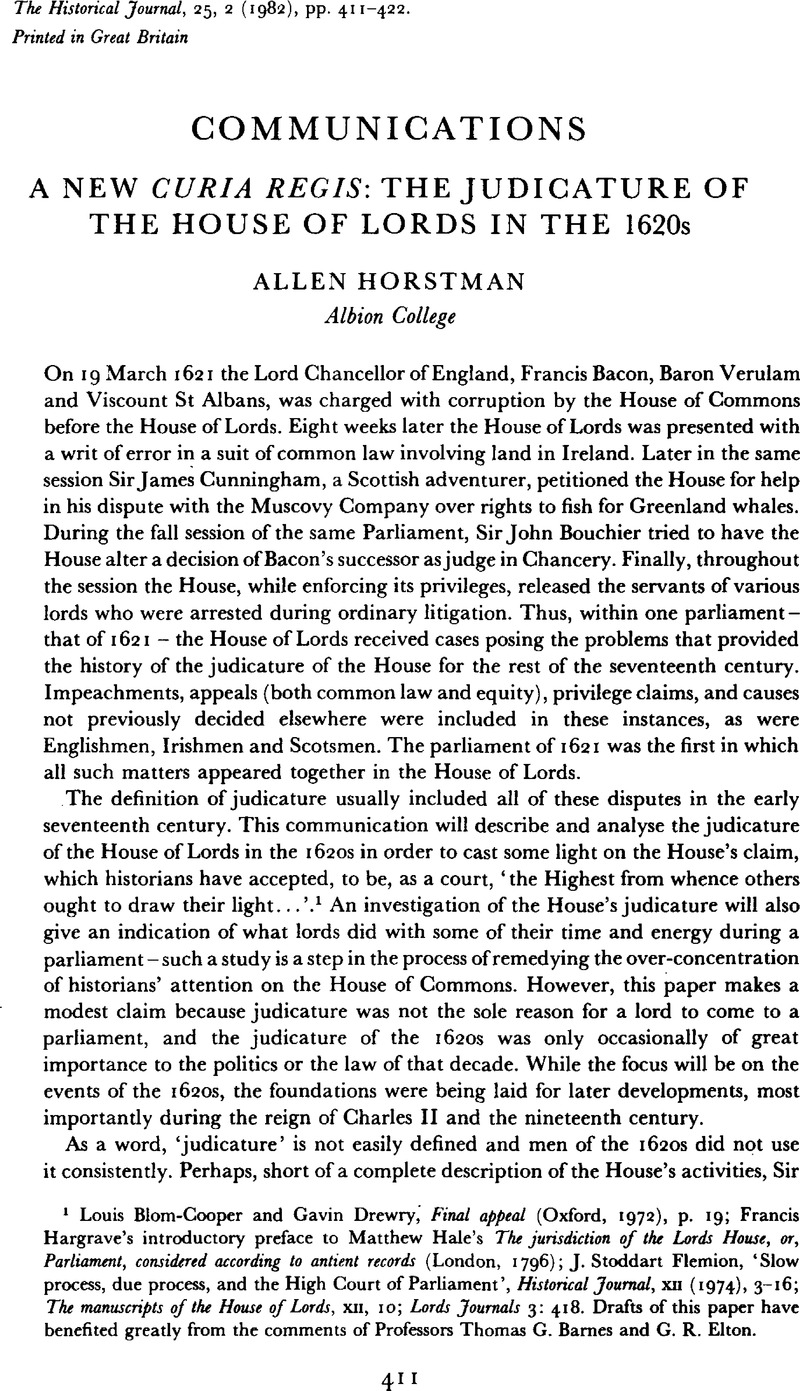Published online by Cambridge University Press: 11 February 2009

1 Louis Blom-Cooper and Gavin Drewry, Final appeal (Oxford, 1972), p. 19Google Scholar; Francis Hargrave's introductory preface to Matthew Hale's The jurisdiction of the Lords House, or, Parliament, considered according to antient records (London, 1796)Google Scholar; Flemion, J. Stoddart, ‘Slow process, due process, and the High Court of Parliament’, Historical Journal, xii (1974), 3–16; The manuscripts of the House of Lords, xii, 10; Lords Journals 3: 418. Drafts of this paper have benefited greatly from the comments of Professors Thomas G. Barnes and G. R. Elton.CrossRefGoogle Scholar
2 B[ritish] L[ibrary], diary of Sir Walter Erle, Add. MSS 18597, Feb. 1624, cited in Foster, E. R., ‘Petitions and the Petition of Right’, Journal of British Studies, xiv (1974), 21.CrossRefGoogle Scholar
3 Relf, F. H., The Petition of Right (Minneapolis, 1917), pp. 36–43Google Scholar. Another definition by Sir Edward occurred in 1621: W. Notestein, et al. (eds.), Debates of the House of Commons in 1621, ii, 195. What Coke and the other common lawyers meant the Petition of Right to be legally still puzzles historians. ‘It was a deliberately antiquarian attempt to revert to an older method of legislation’: ***Russell, Conrad, Parliaments and English politics, 1621–1629 (Oxford, 1979), p. 309CrossRefGoogle Scholar. It was an effort to make the king ‘speak judicially’, said Coke: BL Harleian MSS 5324 fo. 29, found in Johnson, Robert C., et al. (eds.), Commons debates in 1628, iii, 289Google Scholar. ‘On both sides there may have been deliberate intentions to mislead or unwise ambitions to dowse controversy by circumventing knotty problems’: Jones, W. J., Politics and the Bench (London, 1971), p. 73.Google Scholar
4 Tite, Colin G. C., Impeachment and parliamentary judicature in early Stuart England (London, 1974).Google Scholar
5 Lords Journals 1: 22, 624, 2: 38, 92, 165; Croke's reports of the time of James I, pp. 334, 341.
6 House of Lords Record Office, main papers (hereafter cited as H.L.R.O.) 20 May 1624, 9 July 1624.
7 Acts of the Privy Council, 28 Feb. 1621, 8 Aug. 1622, 6 June 1624, 19 July 1628, H.L.R.O. 2 March 1626.
8 Lords Journals 3: 412, 569, H.L.R.O. 25 May 1621, 14 May 1624, 9 March 1625, 21 March 1626.
9 H.L.R.O. 21 March 1624, 6 Feb. 1626; Lords Journals 3: 832; Chaudhuri, K. N., The English East India Company (London, 1965).Google Scholar
10 H.L.R.O. 18 May 1621, 9 March, 16 March, 23 March, 28 May 1628; Lords Journals 3: 416, 511, 529, 532, 541; Prestwich, Menna, Cranfield: politics and profit under the early Stuarts (Oxford, 1966), p. 389Google Scholar. The cabinet may have ended up with the clerk of the House: Foster, E. R., The painful labour of Mr Elsying (Transactions of The American Philosophical Society new series, lxii, 8 (1972)), 8.Google Scholar
11 H.L.R.O. 14 May 1624, 9 July 1625; Lords Journals 3: 462, 833, 872.
12 Lords Journals 3: 157, 190,270, 303, 413, 540, 871; H.L.R.O. 26 May 1624, 30 April 1626. Many of the rules were not formally ordered by the House but were practices of the committee for petitions.
13 Curiously, the role of the members of the House of Commons in the origins and continuation of the judicature of the House of Lords, except for impeachments, remains a mystery. Relf, F. H. believed that the common lawyers in the Commons encouraged the lords: Notes of the debates in the House of Lords, 1621...1628 (Camden Society, London, 1929), p. xxxiGoogle Scholar. Some evidence is collected by Stoddart, Jessie (Flemion), ‘Constitutional Crisis and the House of Lords 1621–1629’ (unpub. Ph.D. thesis, University of California, Berkeley, 1966), p. 167.Google Scholar
14 Conrad Russell, Parliaments and English politics.
15 H.L.R.O. 30 May 1628.
16 B.L. Lansdowne MS 167, fos. 212–14; H.L.R.O. 31 March 1626; Barnes, Thomas G., ‘Star Chamber litigants and their counsel, 1596–1641’, Legal Records and the Historian, Baker, J. H., ed. (London, 1978), pp. 7–28Google Scholar; Hughes, William, The Grand Abridgment of the Law Continued (London, 1660), 1, 75, 165, 514, 680; in, 1950, 2100.Google Scholar
17 Lords Journals 3: 831, 862.
18 H.L.R.O. 3 Dec. 1621, 14 May 1624, 16 March 1626; Hacket, John, Scrinia Reserta (London, 1693), p. 191Google Scholar; Collier, J. P. (ed.), The Egerton Papers (Camden Society, London, 1840), p. 464.Google Scholar
19 Other obstacles existed also. The king had to grant the request for a writ of error and, anyway, the case was not final as no judgement had been entered, a necessary prelude to issuance of a writ of error.
20 Pulman, M. B., The Elizabethan Privy Council in the fifteen-seventies (Berkeley, 1971)Google Scholar; Dawson, J. P., ‘The Privy Council and private law in the Tudor and Stuart periods’, Michigan Law Review, xlviii (1950), 393–428, 627–56.CrossRefGoogle Scholar